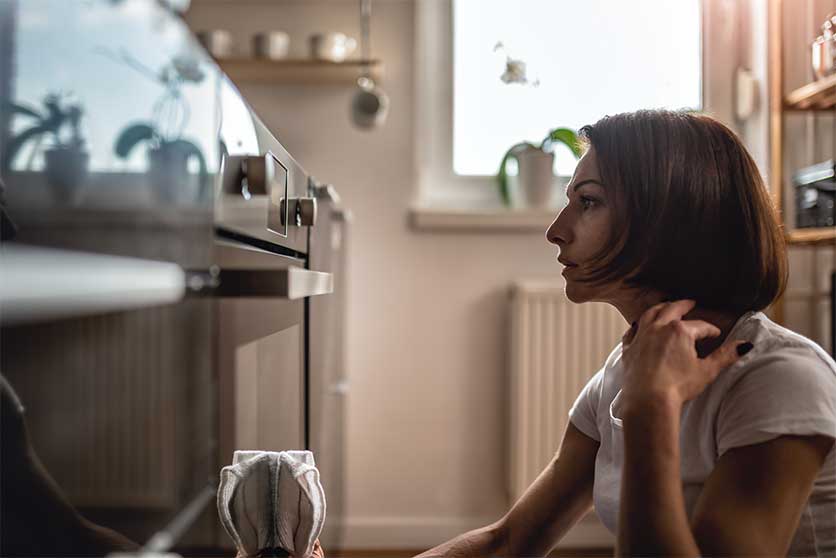Obsessive-Compulsive Disorder (OCD) Treatment At ORC

Medically Reviewed By: Manish Mishra, MBBS
The intrusive thoughts and irrational urges to take repetitive actions that come with OCD can make it difficult to function, affecting daily living. Comprehensive treatment at ORC can help you manage your symptoms and live a more peaceful life.

The most widely recognized sign of obsessive-compulsive disorder (OCD) may be compulsive handwashing, but the mental health condition can involve a wide range of obsessive thoughts and fears and compulsive or avoidant behaviors.
If you are experiencing symptoms of this anxiety disorder, you don’t have to go on allowing them to interfere with your daily life.
The residential program at Ohio Recovery Center offers an evidence-based, multidisciplinary approach to treatment, providing all the tools you need to manage your OCD symptoms today and into the future.
Treatment For OCD At Ohio Recovery Center
At Ohio Recovery Center, we provide a wide range of treatment options for mental health disorders, including specialized treatments for OCD.
Our comprehensive services are provided on our beautiful 55-acre campus in northwest Ohio, where 24/7 support and care from medical and clinical professionals helps ensure that all your needs are met for lasting recovery.
You’ll stay in one of our cozy, gender-specific cottages, enjoy nutritious home-cooked meals, and have time for relaxing and for taking part in wellness and social activities, like cookouts, karaoke, hiking, yoga classes, basketball, and more.
Your individualized treatment plan will include evidence-based options, such as medication, cognitive behavioral therapy (CBT), exposure interventions, and support groups, as well as holistic treatment options like mindfulness-based meditation.
Medication
A mental health professional may prescribe certain antidepressant medications that can be helpful for people with OCD.
The primary type of antidepressants used are selective serotonin reuptake inhibitors (SSRIs), including fluoxetine (Prozac), fluvoxamine (Luvox), and sertraline (Zoloft). The tricyclic antidepressant clomipramine (Anafranil) may also be used.
Psychotherapy
CBT can help people with OCD learn how to recognize intrusive thoughts early on and address them in healthy ways in order to reduce or avoid compulsions.
In addition to talk therapy, exposure interventions can help you gradually and safely learn how to face your fears without reacting in unwanted ways.
Other forms of therapy may also be beneficial, including in group settings.
Other Treatment Options
Support groups made up of peers learning how to manage their OCD can prove beneficial as well.
People with OCD may also benefit from mindfulness practices, such as meditation, which can help you become present and grounded in the moment.
If more standard methods of treatment do not prove successful, transcranial magnetic stimulation (TMS) or deep brain stimulation (DBS) may be worth looking into.
Learn More About OCD
Obsessive-compulsive disorder is a chronic disorder in which a person has obsessions or compulsions that are uncontrollable.
Diagnosis
Symptoms of OCD may begin in childhood but can also develop during adolescence or adulthood. The average age of onset for OCD is 19.5 years old, according to a recent report in American Family Physician.
To be diagnosed with OCD, a person must have compulsions, obsessions, or both. There are also disorders related to OCD such as hoarding disorder and trichotillomania.
Signs & Symptoms
Symptoms of OCD include compulsions and obsessions.
Compulsions may consist of frequent handwashing, continually checking to see if doors are locked, and consistently re-counting footsteps, money, or other items.
Compulsions are repetitive behaviors or mental acts that occur due to obsessions, also called intrusive thoughts, such as a fear of germs or of someone breaking into your home.
Obsessions may also include:
- the fear of speaking inappropriately in public
- doubts about having done something, such as closing the garage door or turning off the stove
- unpleasant sexual images
When obsessions are controlling behavior, a person may act in ways they don’t want to, recognizing the action is irrational.
Risk Factors
Risk factors associated with OCD include family history, brain structure and functioning, and traumatic experiences. People with close relatives who have OCD, such as a parent or sibling, are more likely to develop the disorder.
Other facts about OCD include:
- 1.2% of U.S. adults have OCD.
- Most people are diagnosed by age 19 or 20, but symptoms may not show in some until their 30s or even later.
- OCD is more common among women than men.
Seek Help At Ohio Recovery Center Today
To learn more about the OCD treatment options at Ohio Recovery Center, contact us today.
- MMC: Psychiatry — Clinical Treatment of Obsessive Compulsive Disorder https://www.ncbi.nlm.nih.gov/pmc/articles/PMC2993523/
- National Alliance on Mental Illness — Obsessive-Compulsive Disorder https://www.nami.org/About-Mental-Illness/Mental-Health-Conditions/Obsessive-compulsive-Disorder
- National Institute of Mental Health — Obsessive-Compulsive Disorder https://www.nimh.nih.gov/health/topics/obsessive-compulsive-disorder-ocd
- National Library of Medicine: MedlinePlus — Obsessive-Compulsive Disorder https://medlineplus.gov/obsessivecompulsivedisorder.html
- National Library of Medicine: StatPearls — Obsessive-Compulsive Disorder https://www.ncbi.nlm.nih.gov/books/NBK553162/

